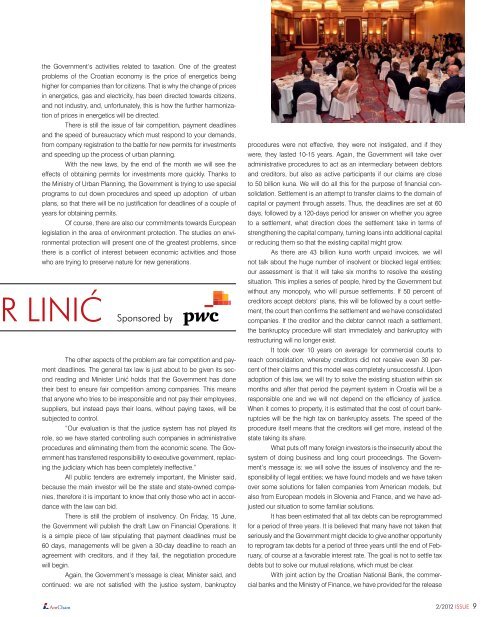Download this issue - AmCham
Download this issue - AmCham
Download this issue - AmCham
- No tags were found...
You also want an ePaper? Increase the reach of your titles
YUMPU automatically turns print PDFs into web optimized ePapers that Google loves.
the Government’s activities related to taxation. One of the greatestproblems of the Croatian economy is the price of energetics beinghigher for companies than for citizens. That is why the change of pricesin energetics, gas and electricity, has been directed towards citizens,and not industry, and, unfortunately, <strong>this</strong> is how the further harmonizationof prices in energetics will be directed.There is still the <strong>issue</strong> of fair competition, payment deadlinesand the speed of bureaucracy which must respond to your demands,from company registration to the battle for new permits for investmentsand speeding up the process of urban planning.With the new laws, by the end of the month we will see theeffects of obtaining permits for investments more quickly. Thanks tothe Ministry of Urban Planning, the Government is trying to use specialprograms to cut down procedures and speed up adoption of urbanplans, so that there will be no justification for deadlines of a couple ofyears for obtaining permits.Of course, there are also our commitments towards Europeanlegislation in the area of environment protection. The studies on environmentalprotection will present one of the greatest problems, sincethere is a conflict of interest between economic activities and thosewho are trying to preserve nature for new generations.r Linić Sponsored byThe other aspects of the problem are fair competition and paymentdeadlines. The general tax law is just about to be given its secondreading and Minister Linić holds that the Government has donetheir best to ensure fair competition among companies. This meansthat anyone who tries to be irresponsible and not pay their employees,suppliers, but instead pays their loans, without paying taxes, will besubjected to control.“Our evaluation is that the justice system has not played itsrole, so we have started controlling such companies in administrativeprocedures and eliminating them from the economic scene. The Governmenthas transferred responsibility to executive government, replacingthe judiciary which has been completely ineffective.”All public tenders are extremely important, the Minister said,because the main investor will be the state and state-owned companies,therefore it is important to know that only those who act in accordancewith the law can bid.There is still the problem of insolvency. On Friday, 15 June,the Government will publish the draft Law on Financial Operations. Itis a simple piece of law stipulating that payment deadlines must be60 days, managements will be given a 30-day deadline to reach anagreement with creditors, and if they fail, the negotiation procedurewill begin.Again, the Government’s message is clear, Minister said, andcontinued: we are not satisfied with the justice system, bankruptcyprocedures were not effective, they were not instigated, and if theywere, they lasted 10-15 years. Again, the Government will take overadministrative procedures to act as an intermediary between debtorsand creditors, but also as active participants if our claims are closeto 50 billion kuna. We will do all <strong>this</strong> for the purpose of financial consolidation.Settlement is an attempt to transfer claims to the domain ofcapital or payment through assets. Thus, the deadlines are set at 60days, followed by a 120-days period for answer on whether you agreeto a settlement, what direction does the settlement take in terms ofstrengthening the capital company, turning loans into additional capitalor reducing them so that the existing capital might grow.As there are 43 billion kuna worth unpaid invoices, we willnot talk about the huge number of insolvent or blocked legal entities;our assessment is that it will take six months to resolve the existingsituation. This implies a series of people, hired by the Government butwithout any monopoly, who will pursue settlements. If 50 percent ofcreditors accept debtors’ plans, <strong>this</strong> will be followed by a court settlement,the court then confirms the settlement and we have consolidatedcompanies. If the creditor and the debtor cannot reach a settlement,the bankruptcy procedure will start immediately and bankruptcy withrestructuring will no longer exist.It took over 10 years on average for commercial courts toreach consolidation, whereby creditors did not receive even 30 percentof their claims and <strong>this</strong> model was completely unsuccessful. Uponadoption of <strong>this</strong> law, we will try to solve the existing situation within sixmonths and after that period the payment system in Croatia will be aresponsible one and we will not depend on the efficiency of justice.When it comes to property, it is estimated that the cost of court bankruptcieswill be the high tax on bankruptcy assets. The speed of theprocedure itself means that the creditors will get more, instead of thestate taking its share.What puts off many foreign investors is the insecurity about thesystem of doing business and long court proceedings. The Government’smessage is: we will solve the <strong>issue</strong>s of insolvency and the responsibilityof legal entities; we have found models and we have takenover some solutions for fallen companies from American models, butalso from European models in Slovenia and France, and we have adjustedour situation to some familiar solutions.It has been estimated that all tax debts can be reprogrammedfor a period of three years. It is believed that many have not taken thatseriously and the Government might decide to give another opportunityto reprogram tax debts for a period of three years until the end of February,of course at a favorable interest rate. The goal is not to settle taxdebts but to solve our mutual relations, which must be clear.With joint action by the Croatian National Bank, the commercialbanks and the Ministry of Finance, we have provided for the release2/2012 ISSUE 9













